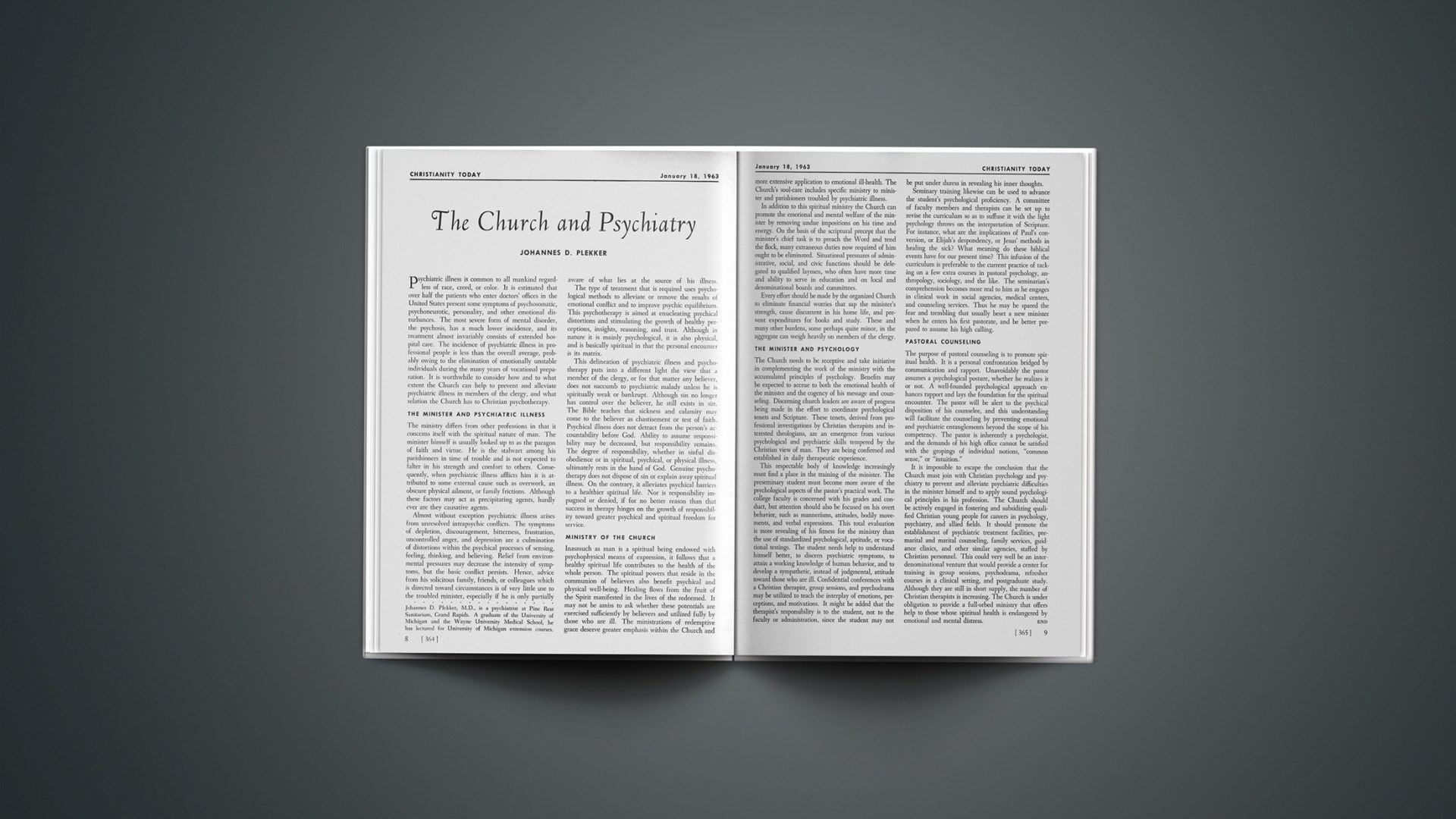Psychiatric illness is common to all mankind regardless of race, creed, or color. It is estimated that over half the patients who enter doctors’ offices in the United States present some symptoms of psychosomatic, psychoneurotic, personality, and other emotional disturbances. The most severe form of mental disorder, the psychosis, has a much lower incidence, and its treatment almost invariably consists of extended hospital care. The incidence of psychiatric illness in professional people is less than the overall average, probably owing to the elimination of emotionally unstable individuals during the many years of vocational preparation. It is worthwhile to consider how and to what extent the Church can help to prevent and alleviate psychiatric illness in members of the clergy, and what relation the Church has to Christian psychotherapy.
The Minister And Psychiatric Illness
The ministry differs from other professions in that it concerns itself with the spiritual nature of man. The minister himself is usually looked up to as the paragon of faith and virtue. He is the stalwart among his parishioners in time of trouble and is not expected to falter in his strength and comfort to others. Consequently, when psychiatric illness afflicts him it is attributed to some external cause such as overwork, an obscure physical ailment, or family frictions. Although these factors may act as precipitating agents, hardly ever are they causative agents.
Almost without exception psychiatric illness arises from unresolved intrapsychic conflicts. The symptoms of depletion, discouragement, bitterness, frustration, uncontrolled anger, and depression are a culmination of distortions within the psychical processes of sensing, feeling, thinking, and believing. Relief from environmental pressures may decrease the intensity of symptoms, but the basic conflict persists. Hence, advice from his solicitous family, friends, or colleagues which is directed toward circumstances is of very little use to the troubled minister, especially if he is only partially aware of what lies at the source of his illness.
The type of treatment that is required uses psychological methods to alleviate or remove the results of emotional conflict and to improve psychic equilibrium. This psychotherapy is aimed at enucleating psychical distortions and stimulating the growth of healthy perceptions, insights, reasoning, and trust. Although in nature it is mainly psychological, it is also physical, and is basically spiritual in that the personal encounter is its matrix.
This delineation of psychiatric illness and psychotherapy puts into a different light the view that a member of the clergy, or for that matter any believer, does not succumb to psychiatric malady unless he is spiritually weak or bankrupt. Although sin no longer has control over the believer, he still exists in sin. The Bible teaches that sickness and calamity may come to the believer as chastisement or test of faith. Psychical illness does not detract from the person’s accountability before God. Ability to assume responsibility may be decreased, but responsibility remains. The degree of responsibility, whether in sinful disobedience or in spiritual, psychical, or physical illness, ultimately rests in the hand of God. Genuine psychotherapy does not dispose of sin or explain away spiritual illness. On the contrary, it alleviates psychical barriers to a healthier spiritual life. Nor is responsibility impugned or denied, if for no better reason than that success in therapy hinges on the growth of responsibility toward greater psychical and spiritual freedom for service.
Ministry Of The Church
Inasmuch as man is a spiritual being endowed with psychophysical means of expression, it follows that a healthy spiritual life contributes to the health of the whole person. The spiritual powers that reside in the communion of believers also benefit psychical and physical well-being. Healing flows from the fruit of the Spirit manifested in the lives of the redeemed. It may not be amiss to ask whether these potentials are exercised sufficiently by believers and utilized fully by those who are ill. The ministrations of redemptive grace deserve greater emphasis within the Church and more extensive application to emotional ill-health. The Church’s soul-care includes specific ministry to minister and parishioners troubled by psychiatric illness.
In addition to this spiritual ministry the Church can promote the emotional and mental welfare of the minister by removing undue impositions on his time and energy. On the basis of the scriptural precept that the minister’s chief task is to preach the Word and tend the flock, many extraneous duties now required of him ought to be eliminated. Situational pressures of administrative, social, and civic functions should be delegated to qualified laymen, who often have more time and ability to serve in education and on local and denominational boards and committees.
Every effort should be made by the organized Church to eliminate financial worries that sap the minister’s strength, cause discontent in his home life, and prevent expenditures for books and study. These and many other burdens, some perhaps quite minor, in the aggregate can weigh heavily on members of the clergy.
The Minister And Psychology
The Church needs to be receptive and take initiative in complementing the work of the ministry with the accumulated principles of psychology. Benefits may be expected to accrue to both the emotional health of the minister and the cogency of his message and counseling. Discerning church leaders are aware of progress being made in the effort to coordinate psychological tenets and Scripture. These tenets, derived from professional investigations by Christian therapists and interested theologians, are an emergence from various psychological and psychiatric skills tempered by the Christian view of man. They are being confirmed and established in daily therapeutic experience.
This respectable body of knowledge increasingly must find a place in the training of the minister. The preseminary student must become more aware of the psychological aspects of the pastor’s practical work. The college faculty is concerned with his grades and conduct, but attention should also be focused on his overt behavior, such as mannerisms, attitudes, bodily movements, and verbal expressions. This total evaluation is more revealing of his fitness for the ministry than the use of standardized psychological, aptitude, or vocational testings. The student needs help to understand himself better, to discern psychiatric symptoms, to attain a working knowledge of human behavior, and to develop a sympathetic, instead of judgmental, attitude toward those who are ill. Confidential conferences with a Christian therapist, group sessions, and psychodrama may be utilized to teach the interplay of emotions, perceptions, and motivations. It might be added that the therapist’s responsibility is to the student, not to the faculty or administration, since the student may not be put under duress in revealing his inner thoughts.
Seminary training likewise can be used to advance the student’s psychological proficiency. A committee of faculty members and therapists can be set up to revise the curriculum so as to suffuse it with the light psychology throws on the interpretation of Scripture. For instance, what are the implications of Paul’s conversion, or Elijah’s despondency, or Jesus’ methods in healing the sick? What meaning do these biblical events have for our present time? This infusion of the curriculum is preferable to the current practice of tacking on a few extra courses in pastoral psychology, anthropology, sociology, and the like. The seminarian’s comprehension becomes more real to him as he engages in clinical work in social agencies, medical centers, and counseling services. Thus he may be spared the fear and trembling that usually beset a new minister when he enters his first pastorate, and be better prepared to assume his high calling.
Pastoral Counseling
The purpose of pastoral counseling is to promote spiritual health. It is a personal confrontation bridged by communication and rapport. Unavoidably the pastor assumes a psychological posture, whether he realizes it or not. A well-founded psychological approach enhances rapport and lays the foundation for the spiritual encounter. The pastor will be alert to the psychical disposition of his counselee, and this understanding will facilitate the counseling by preventing emotional and psychiatric entanglements beyond the scope of his competency. The pastor is inherently a psychologist, and the demands of his high office cannot be satisfied with the gropings of individual notions, “common sense,” or “intuition.”
It is impossible to escape the conclusion that the Church must join with Christian psychology and psychiatry to prevent and alleviate psychiatric difficulties in the minister himself and to apply sound psychological principles in his profession. The Church should be actively engaged in fostering and subsidizing qualified Christian young people for careers in psychology, psychiatry, and allied fields. It should promote the establishment of psychiatric treatment facilities, premarital and marital counseling, family services, guidance clinics, and other similar agencies, staffed by Christian personnel. This could very well be an interdenominational venture that would provide a center for training in group sessions, psychodrama, refresher courses in a clinical setting, and postgraduate study. Although they are still in short supply, the number of Christian therapists is increasing. The Church is under obligation to provide a full-orbed ministry that offers help to those whose spiritual health is endangered by emotional and mental distress.
END










